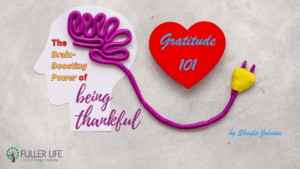Celebrate Your Efforts and Increase Self-Control
“Each day you work toward your big goal should be considered a success! You’re doing something now that directly affects your success later.” Brad Hussey
Wouldn’t it be great to build up our self-control “muscles?” More “staying power” could make a big difference in so many areas. According to a recent compilation of lab experiments on self-control, four emotional characteristics were shown to boost our self-control (Desteno, 2014).
- Gratitude
- Compassion
- Guilt
- Authentic pride
Over the past few weeks, Fuller Life’s blog has explored how to develop the characteristics of gratitude, compassion, and guilt. Today’s post will focus on cultivating authentic pride.
Always One More Thing
In a recent TED Talk, Shawn Achor notes that our society has somehow “pushed happiness over the cognitive horizon.”
We tell ourselves all sorts of things:
I will be happy when I achieve ____________. But, the minute I achieve ____________, I still have one more thing.
I just earned my degree, but now I need to find a job.
We just got married, but now we need to buy a home.
Happiness always seems to be beyond the next item on the to-do list. And, the to-do list just keeps getting longer.
We get to the end of our day and notice we did not accomplish everything we had set out to do. We tend to focus on what is lacking, which in turn builds frustration. The next day we wake up feeling more behind than the day before.
In her book Daring Greatly, Brené Brown says, “We start off the morning thinking we didn’t get enough sleep, go through the day thinking we don’t have enough time, and fall asleep thinking we failed to accomplish enough tasks. Whatever we have, do, or get, it’s never enough.”
Happiness eventually feels unattainable, especially when we run into obstacles along the way. Over time, we may lose our motivation to keep trying to find happiness.
Authentic Pride
What if we could bring happiness back to this side of the equation? Could we celebrate the small steps that move us toward our bigger goals? According to the field of positive psychology, we can cultivate authentic pride to help us reach our goals. “Authentic pride derives from specific accomplishments or goal attainments, and is often focused on the efforts made towards that goal” (Tracy & Robins, 2004, 2007a).
Triathlon coach Barrie Shepley points out that anything can happen on race day. So you should reward all the hard work you put into getting to the race!
When we begin to notice the little successes at the end of each day, we begin to experience the positive emotion that comes with affirming that our efforts mean something. Every little thing I accomplish toward my goal matters. When we celebrate our efforts, we cultivate positive emotion. This is motivating!
“Authentic pride is fueled by the emotional rush of accomplishment, confidence, and success, and is associated with pro-social and achievement-oriented behaviors, extraversion, agreeableness, conscientiousness, satisfying interpersonal relationships, and positive mental health” (Kaufman, 2012).
Celebrate Together
 Another aspect of authentic pride is celebrating the successes of those around us. Martin Seligman calls this “active, constructive responding.” When our partner or friend comes to us to share a success, we celebrate with them. For instance, “This is great! I am so proud of you. I know how important this was to you! Please relive the event with me now. Where were you? What did you say? How did you react? We should go out and celebrate.”
Another aspect of authentic pride is celebrating the successes of those around us. Martin Seligman calls this “active, constructive responding.” When our partner or friend comes to us to share a success, we celebrate with them. For instance, “This is great! I am so proud of you. I know how important this was to you! Please relive the event with me now. Where were you? What did you say? How did you react? We should go out and celebrate.”
Seligman includes non-verbal responses that build positive emotions and our bond with others, “Maintaining eye contact, displays of positive emotion, such as genuine smiling, touching, and laughing” (Seligman, 2011).
When we celebrate together, we increase positive feelings and strengthen the health of our relationships.
Tools
- Some of us find it challenging to celebrate and enjoy our efforts toward success. However, negative habits of self-criticism and self-denigration wear away at our perseverance and motivation. Kristen Neff offers a helpful exercise that teaches us how to respond to ourselves in a more compassionate way.
- Make a gratitude list at the end of each day to actively notice the abundance that is already in your life.
- Get an accountability partner to share hopes and goals. Make a list of ideas to reward the accomplishments you achieve as you work toward your goals.
- Get real about time. We often underestimate the time it takes to do things, and we overschedule ourselves. We end up setting ourselves up to feel disappointed that we did not accomplish more. Monica Ricci has helpful tips on creating a more realistic awareness of time and how to budget our tasks accordingly.
Carver, C. S., & Johnson, S. L. (2010). Authentic and Hubristic Pride: Differential Relations to Aspects of Goal Regulation, Affect, and Self-Control. Journal of Research in Personality, 44(6), 698–703.
Desteno, D. (2014). A Feeling of Control: How American Can Finally Learn to Deal with It’s Impulses. Pacific Standard.
Kaufman, B.F. (2012). Pride and Creativity. The Creativity Post. http://www.creativitypost.com/psychology/pride_and_creativity
Seligman, M. (2011). Flourish. A visionary New Understanding of Happiness and Well-being.
Tracy JL, Robins RW. (2007a). Emerging insights into the nature and function of pride. Current Directions in Psychological Science. 16:147–150.
Williams, L. A. & DeSteno, David. (Jun. 2008). Pride and perseverance: The motivational role of pride. Journal of Personality and Social Psychology, Vol 94(6), 1007-1017.










